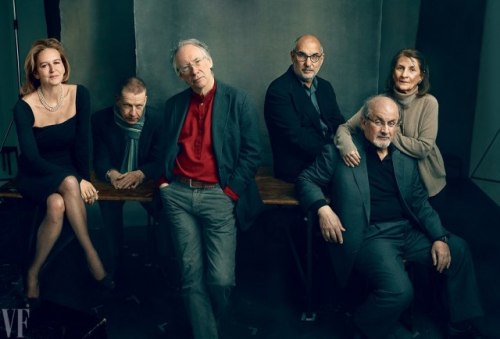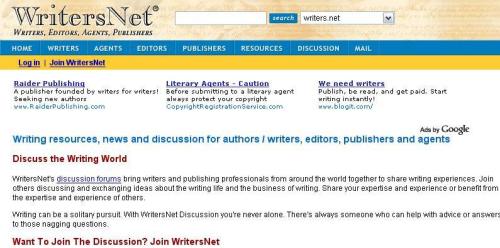Salman Rushdie on the Satanic Verses

Rushdie with friends who supported him during the fatwa. L-R: agent Caroline Michel, writer and editor Gerald Marzorati, novelist Ian McEwan, the BBC’s Alan Yentob, Salman Rushdie, and his sister Sameen, a retired lawyer. Photo by Annie Leibovitz
Author Salman Rushdie talks to Vanity Fair about the Satanic Verses:
I thought of the novel as a huge monster I was wrestling with. I was often worried that I would not be able to get on top of the beast and pin it to the ground. [When it was done,] I was utterly exhausted. One holds so much of a novel in one’s head during the years of work that when it’s done and the thing in your head evaporates it’s a little like having your brain removed. I felt lobotomized.
Read the full-length article on Vanity Fair.
Writers/Editors and Love
 Because it’s the month of love, I thought of all the little things that writers and editors like me love.
Because it’s the month of love, I thought of all the little things that writers and editors like me love.
Writers and editors love a good book, especially something they haven’t read before. I always like to be surprised, so I enjoy receiving books by authors I haven’t read or heard of.
They love a good cup of coffee to start off their writing task. Nothing beats the strong kick of caffeine in the morning. I haven’t met an editor/writer who didn’t love her coffee.
Writers and editors love (and keep) long letters and cards because they know the effort that goes into crafting a note. A new friend N tells me she keeps all the holiday gift cards that come with personal notes. (I do too.)
Writers and editors love a good writing or editing challenge. As an editor, I love the thrill of seeing a raw manuscript and improving it so the rest of the world can enjoy it.
Writers and editors love fine-point pens, newly sharpened pencils, and good, smooth paper. The safest gift, next to a book, you can give a writer or an editor is a good notebook.
Writers and editors love silence.
What about you? What do you love?
Thanks to rknds
Currently Reading: This Is Not Chick Lit
 This Is Not Chick Lit: Original Stories by America’s Best Women Writers, edited by Elizabeth Merrick, has been sitting sadly in my bookshelf for more than a year before I finally picked it up.
This Is Not Chick Lit: Original Stories by America’s Best Women Writers, edited by Elizabeth Merrick, has been sitting sadly in my bookshelf for more than a year before I finally picked it up.
I’m thankful I brought it along on a media coverage and that I finally read it (an ex sent it to me on my birthday last year) because reading it inspired me to write, not another chick lit, but something more meaty, serious, and thought-provoking.
One of the stories I distinctly remember from this selection is “Selling the General” by Jennifer Egan, because it’s a storyline I can relate with. The female character, Dolly, runs a PR agency and is offered a hefty amount to do crisis PR for a South American dictator whose government had slaughtered masses. I loved the snappy dialogue, and while its New York setting and allusion to brand names and private schools for girls might mislead you into thinking this is part of the Gossip Girl series, it’s not.
(Did I mention that I was once a publicist for a former defense secretary? I lasted a little more than a month–not because I didn’t like him. I’ve sworn not to get involved with politics ever.)
The names of the authors don’t ring a bell, but what they’re doing–going out there to give readers something better– is admirable. As editor Elizabeth Merrick writes in her introduction, these are “female writers pushing the envelope of serious writing with depth and humor.” I’ve never written a short story before, but after reading this book, I think I’d like to try my hand at it.
Like mother, like son
My son Jacob grew up wanting to be a book editor like me. He would say, “When I grow up, I want to work at your office at so-and-so.”
I remember when I was project manager for this print-on-demand publishing firm that there were nights I’d come home very late and not get to see him for three straight days, so I’d make up by bringing him to work and he’d settle into one of the empty walk-in closets in the office and read, color, cut paper, or do something productive.
Other times I’d bring a lot of work home, mostly printouts of manuscripts that needed reviewing, and skim through them while he’d sit beside me reading. The printouts would end up in two piles: one with corrections would be brought back to the office. The clean pages would go to him, and he’d pretend he’d be editing them as well.
I didn’t realize how absorbed he was with this “writer” and “editor” thing until recently, when he did the opening prayer during his preschool graduation. My mom, who had been a school principal in her working years, had drawn up the prayer for my little boy and practiced him every night so he would perfect it.
Of course, the ever-stubborn boy would not just take the draft as is: he had his own questions too. One line went, “This will be the last time that we will see each other–all 36 of us . . .” and this six-year-old disagreed with “all 36 of us” because “it is not a sentence, and it is grammatically incorrect”!
My mom was certainly shocked but kept her temper in check. “It’s for emphasis,” she says. “Writers do it a lot.”
And my boy said, “Well, you’re NOT a writer.”
Ooops. Now that’s what I mean by “a little knowledge . . .”
Why an Online Presence Is Important for Writers

If it were difficult to penetrate the international literary scene a decade ago, today many young Filipino writers are getting published in international magazines all because of the Internet. Furthermore, with the advent of Guru, Elance, and other job markets, Filipino writers are able get projects and commissioned work abroad. That means a wider market and more jobs (and more money!) for writers.
Many years ago when I applied for admission at the University of the Philippines, I was weighing the pros and cons of taking creative writing as against journalism. My parents’ advice echoed in my mind: You can never get rich by writing.
Of course, these days, making money through writing is not altogether impossible and one can actually live comfortably by doing copywriting, manuscript editing, and Web content work. While this isn’t the type of creative work that most writers aspire for, it brings food to the table, and whoever said you couldn’t write a novel or a short story on your days off, eh?
A project fell onto my lap a few weeks ago, courtesy of a forgotten profile on Writers.net. Perhaps things like this don’t happen frequently, but it bolsters what I have always believed in: for you to break borders and find jobs elsewhere, you must have an online presence.
Isabel Allende: Real Change Needs Feminine Energy
In this talk at TED2007, Latin American author Isabel Allende talks about writing, passion, and feminism.
“Heart is what drives us and determines our fate,” she says.
That is what I need for the characters in my book–a passionate heart. I need mavericks, dissidents, adventurers, outsiders and rebels who ask questions, bend the rules, and take risks. . . .
Allende also shares stories of powerful women she has met, such as actress Sophia Loren, who like her was one of eight flag bearers at the 2006 Winter Olympics in Turin, Italy. Allende is funny and touching at the same time, and the lesson isn’t lost in the speech.
“For real change, we need feminine energy,” she says. She’s not saying only women should lead but encourages that we “nurture the feminine energy in men.” I wish there were more women like her.
Listen to the talk here.
Rest in Peace, Norman Mailer, 84

“I knew that there was one thing I wanted to be and that was a writer,” he said, and he pursued it. He dies with two Pulitzer Prizes, a National Book Award, and more than 30 novels, biographies, and nonfiction.
Read NYT’s “Norman Mailer, Outspoken Novelist, Dies at 84.”
David Sedaris on a Rainy Friday Night
My busy schedule rarely allows me the chance to relax and read leisurely. But tonight I came home earlier than usual. The boss had let us off at 4 p.m. because of the strong rains.
So on a Friday night I am at home, listening to David Sedaris read an excerpt from Santaland Diaries and sipping newly brewed coffee.
I love the way Sedaris strings words together. His sentences are simply written but forceful. I love how his voice stirs images from my own experience and I am transported to a different time, another place.
Listen to David Sedaris on NPR.
 When I read
When I read